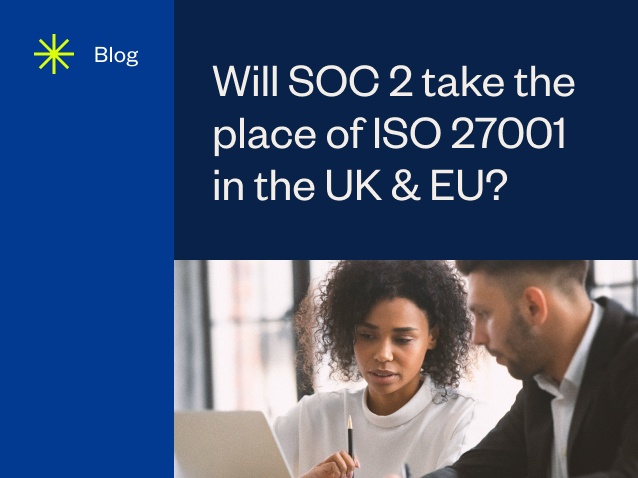Will SOC 2 Take the Place of ISO 27001 in the UK & EU?

Over the last couple years, more and more organisations conducting business throughout the European markets have been seeking a SOC 2 assessment in addition to the ISO 27001 certification. So much so, many have begun to speculate whether the US originated SOC 2 audits will replace the need for the international ISO 27001 certification in these EMEA markets.
The short answer: Not quite.
While both provide some level of assurance to clients and regulating bodies, a SOC 2 assessment and an ISO 27001 certification by definition are two different processes.
ISO 27001 is an internationally recognised standard with a framework of controls that can be applied to any organisation, regardless of the size or sector, with a pass/fail certification decision.
A SOC 2 assessment is an audit standard created by the American Institute of Certified Public Accountants (AICPA) in which a CPA (Certified Public Accountant) will review your policies, procedures, and systems against five categories called Trust Services Criteria (Security, Availability, Processing Integrity, Confidentiality, Privacy). The independent assessor’s detailed SOC 2 report contains their expert opinion of how well the organization meets the selected criteria in regard to protecting all aspects of its systems.
Why the speculation?
The rising use of SOC 2 in the US over the past decade is due to many large companies becoming more proactive about their cybersecurity risk management. These organizations began setting forth requirements stipulating that their vendors must have a SOC 2 report ready as part of the due diligence process.
Over the past two years, a similar chain of events has started to play out in Europe. Increasingly, companies in certain key industry sectors require SOC 2 reports so they can determine whether organisations along the supply chain have the necessary controls in place to protect the data of all parties involved.
The SOC 2 report is more in-depth than an ISO 27001 certificate. With the result of a SOC 2 assessment being an extensive attestation report up to 150+ pages in length, it tends to give a company’s partners and clients a higher level of detail about their security posture compared to the result of an ISO 27001 audit which is simply a one-page certification letter. This is one of the leading reasons why the cybersecurity compliance norm in Europe is beginning to welcome SOC 2 as an excellent supplemental security framework.
Which is better: SOC 2 or ISO 27001?
Because the two differ in scope and function, identifying one as superior over the other isn’t the correct way to think about it. Depending on the organization’s goals and capabilities, one may be better to prioritize as the first approach to security. Identifying which one is right for your organization can be done by consulting with an information security governance, risk and compliance management consultancy firm.
You may find that leveraging both a SOC 2 assessment and an ISO 27001 certification only increases the efficacy and durability of your cybersecurity posture, enabling you to tap into the US and EMEA markets with a greater competitive edge. Utilising audit management software such as A-SCEND allows organizations to easily satisfy multiple audit requirements by deduplicating evidence collection, saving time and resources during the completion of both audits.
Different Markets Require Different Compliance Needs
In addition to SOC 2 and ISO 27001, there are several different certifications and standards that organizations can leverage to remain compliant in their region of operation and improve their security posture. For organizations who wish to do business in the UK, attaining a Cyber Essentials (CE) Certification (a certification developed by the UK Government and industry to help protect organizations against common online attacks) is a must. Additionally, compliance with the Data Protection Act 2018 is another compliance requirement unique to the UK.
Equally, operators of essential services (OES) and related digital service providers (RDSPs) in the EU must adhere to the NIS Directive (Directive on security of network and information systems). Any company conducting business and/or processing EU residents’ personal information must comply with the GDPR (General Data Protection Regulation).
Strengthening Your Business’s Compliance Programme
Ensuring the privacy of consumer data and the protection of information will continue to be of utmost importance for your organisation in the coming years. If you’re looking to fine-tune your business’s compliance programme in order to abide by the latest regulations, while also winning new business, A-LIGN can help. Our expertise spans privacy impact assessments, GDPR-related services, ISO 27001 Certification and SOC 2 examinations. We have everything needed to take your compliance program to new heights.
